Related Research Articles

Jacob, later given the name Israel, is regarded as a patriarch of the Israelites and is an important figure in Abrahamic religions, such as Judaism, Samaritanism, Christianity, and Islam. Jacob first appears in the Book of Genesis, originating from the Hebrew tradition in the Torah. Described as the son of Isaac and Rebecca, and the grandson of Abraham, Sarah, and Bethuel, Jacob is presented as the second-born among Isaac's children. His fraternal twin brother is the elder, named Esau, according to the biblical account. Jacob is said to have bought Esau's birthright and, with his mother's help, deceived his aging father to bless him instead of Esau. Later in the narrative, following a severe drought in his homeland of Canaan, Jacob and his descendants, with the help of his son Joseph, moved to Egypt where Jacob died at the age of 147. He is supposed to have been buried in the Cave of Machpelah.
Potiphar is a figure in the Hebrew Bible and the Quran. His name possibly indicates the same figure as Potiphera.

Joseph is an important Hebrew figure in the Bible's Book of Genesis and in the Quran. He was the first of the two sons of Jacob and Rachel. He is the founder of the Tribe of Joseph among the Israelites. His story functions as an explanation for Israel's residence in Egypt. He is the favourite son of the patriarch Jacob, and his jealous brothers sell him into slavery in Biblical Egypt, where he eventually ends up incarcerated. After correctly interpreting the dreams of Pharaoh, however, he rises to second-in-command in Egypt and saves Egypt during a famine. Jacob's family travels to Egypt to escape the famine, and it is through him that they are given leave to settle in the Land of Goshen.
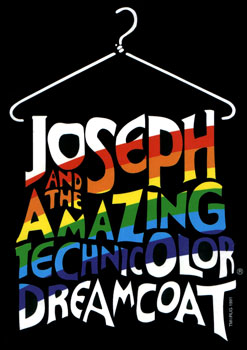
Joseph and the Amazing Technicolor Dreamcoat is a sung-through musical with lyrics by Tim Rice and music by Andrew Lloyd Webber, based on the character of Joseph from the Bible's Book of Genesis. This was the first Lloyd Webber and Rice musical to be performed publicly; their first collaboration, The Likes of Us, written in 1965, was not performed until 2005. Its family-friendly retelling of Joseph, familiar themes, and catchy music have resulted in numerous stagings. According to the owner of the copyright, the Really Useful Group, by 2008 more than 20,000 schools and amateur theatre groups had staged productions.

Yusuf is a prophet and messenger of God mentioned in the Quran and corresponds to Joseph, a person from the Hebrew and Christian Bible who was said to have lived in Egypt before the New Kingdom. Of Jacob's children, Joseph reportedly had the gift of prophecy through dreams. Although the narratives of other prophets are presented in a number of surahs, Joseph's complete narrative appears in only one: Yusuf. Said to be the most detailed narrative in the Quran, it contains more details than its biblical counterpart.
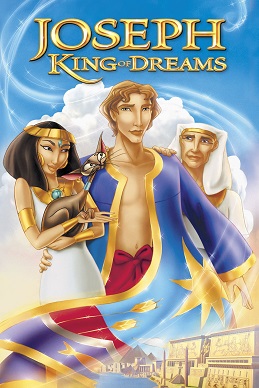
Joseph: King of Dreams is a 2000 American direct-to-video animated biblical musical drama film. The second film adaptation of the Bible from DreamWorks Animation and the only direct-to-video production they released, the film is an adaptation of the story of Joseph from the Book of Genesis in the Bible and serves as a prequel to the 1998 film The Prince of Egypt. Composer Daniel Pelfrey stated that the film was designed as a companion piece to The Prince of Egypt, noting that though "Joseph turned out to be very different than The Prince of Egypt, it was very challenging and rewarding".

Vayeshev, Vayeishev, or Vayesheb is the ninth weekly Torah portion in the annual Jewish cycle of Torah reading. The parashah constitutes Genesis 37:1–40:23. The parashah tells the stories of how Jacob's other sons sold Joseph into captivity in Egypt, how Judah wronged his daughter-in-law Tamar who then tricked him into fulfilling his oath, and how Joseph served Potiphar and was imprisoned when falsely accused of assaulting Potiphar's wife.

Vayigash or Vaigash is the eleventh weekly Torah portion in the annual Jewish cycle of Torah reading. It constitutes Genesis 44:18–47:27.

Miketz or Mikeitz is the tenth weekly Torah portion in the annual Jewish cycle of Torah reading. It constitutes Genesis 41:1–44:17. The parashah tells of Joseph's interpretation of Pharaoh's dreams, Joseph's rise to power in Egypt, and Joseph's testing of his brothers.

Aubrey Harold Woods was an English actor. He is best remembered for playing Bill in Willy Wonka & the Chocolate Factory, where he sang "The Candy Man".
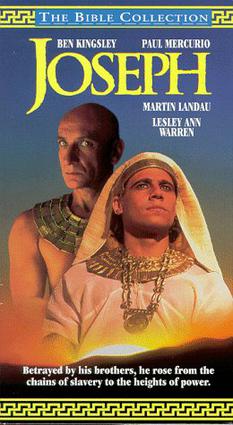
The Bible: Joseph is a 1995 German/Italian/American television miniseries about the life of Joseph from the Old Testament. It was filmed in Morocco and aired on TNT. At the 47th Primetime Emmy Awards, Joseph won one award from five nominations.
"Any Dream Will Do" is a popular song written by Andrew Lloyd Webber and Tim Rice for the 1968 musical Joseph and the Amazing Technicolor Dreamcoat. It is generally the beginning and the concluding song of the musical, sung by the title character of Joseph.

Any Dream Will Do, is a 2007 talent show-themed television series produced by the BBC in the United Kingdom. It searched for a new, unknown lead to play Joseph in a West End revival of the Andrew Lloyd Webber musical Joseph and the Amazing Technicolor Dreamcoat.
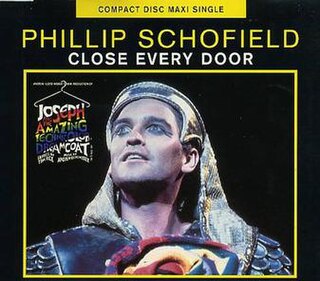
"Close Every Door" is a song from the musical Joseph and the Amazing Technicolor Dreamcoat by Tim Rice and Andrew Lloyd Webber. It is the penultimate song of the first act of the musical, sung by Joseph while imprisoned for his supposed relationship with Potiphar's wife. Along with "Any Dream Will Do", it is one of the most popular songs from the musical.

Lee Stephen Mead is an English musical theatre, television actor and occasional singer, best known for winning the title role in the 2007 West End revival of Joseph and the Amazing Technicolor Dreamcoat through the BBC TV casting show Any Dream Will Do. As well as subsequent West End roles in Wicked, Legally Blonde: The Musical and The West End Men, Mead has pursued a music career, releasing four solo albums and undertaking concert tours in the UK and Japan.

Joseph is an oratorio by George Frideric Handel completed in the summer of 1743. Joseph is composed to an English language libretto by the Reverend James Miller, based on Apostolo Zeno's Italian language libretto for Giuseppe, an oratorio by Antonio Caldara. It received its premiere performance that following Lenten season on 2 March 1744 at the Covent Garden Theatre.
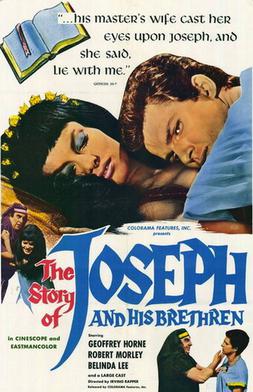
The Story of Joseph and His Brethren is a 1961 Yugoslavian/Italian film directed by Irving Rapper and Luciano Ricci.
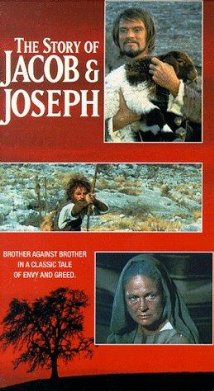
The Story of Jacob and Joseph is a 1974 American Biblical drama television film directed by Michael Cacoyannis, based on the Biblical Book of Genesis with a screenplay written by Ernest Kinoy. It stars Keith Michell as Jacob, Tony Lo Bianco as Joseph, Colleen Dewhurst as Rebekah, Herschel Bernardi as Laban, Harry Andrews as Isaac, and Julian Glover as Esau.

Biblical Egypt, or Mizraim, is a theological term used by historians and scholars to differentiate between Ancient Egypt as it is portrayed in Judeo-Christian texts and what is known about the region based on archaeological evidence. Along with Canaan, Egypt is one of the most commonly mentioned locations in the Bible, and its people, the Egyptians, play important roles in the story of the Israelites. Although interaction between Egypt and nearby Semitic-speaking peoples is attested in archaeological sources, they do not otherwise corroborate the biblical account.

José do Egito is a Brazilian miniseries produced and broadcast by RecordTV. It premiered on January 30, 2013 and ended on October 9, 2013. It is based on the biblical account of the book of Genesis that deals with the patriarch Joseph, son of Jacob.
References
- ↑ Mark Deming (2013). "Joseph and the Amazing Technicolor Dreamcoat (1999)". Movies & TV Dept. The New York Times . Archived from the original on 2013-12-25. Retrieved 2013-11-05.
- ↑ "Donny Osmond and 'Joseph and the Amazing Technicolor Dreamcoat' coming to movie theaters (video)". M Live. 2 March 2012. Retrieved 2013-10-30.
- ↑ "Lloyd Webber catalog repackaged for video". Billboard. Retrieved 2013-10-30.
- ↑ "Joseph and the Amazing Technicolor Dreamcoat". Rotten Tomatoes. Retrieved 2013-10-30.
- ↑ "Introduction". PBS. 5 April 2000. Retrieved 2013-10-30.
- ↑ "Joseph and the Amazing Technicolor Dreamcoat". TheMovieReport. Retrieved 2013-11-10.